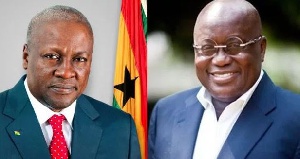 Former President John Mahama and President Akufo-Addo
Former President John Mahama and President Akufo-Addo
It is emerging that disgraced global political data-analysis firm, Cambridge Analytica had their tentacles extended in Ghana ahead of the 2016 elections.
Leaked documents show that among other things, the then Mahama-led administration employed their services to gauge the NDC’s chances of winning the 2016 elections.
The election documents exposed by Hindsight Files on social media in January were obtained from the hard drive of Brittany Kaiser, who held several senior positions at SCL Group including one of its subsidiaries, Cambridge Analytica.
According to Brittany Kaiser, the documents of SCL Group included activities in Kenya, Brazil, Malaysia, the USA (in files marked Iran and Bolton) and Ghana.
In the case of Ghana, several documents reference that SCL was commissioned by the Ministry of Health in 2014 to conduct a large study on health practices and requirements in Ghana.
SCL conducted 30,000 household surveys in 97 constituencies across 10 regions. In a later report to the ruling National Democratic Congress (NDC) party, research-based on 30,000 surveys etc. "allowed SCL to model the future vote distribution within each constituency in Ghana based on how respondents said that they would vote should there be an election tomorrow."
Pertinent topics used for the survey included key issues in contemporary Ghana; perceptions of the President of Ghana (John Mahama); perceptions of political parties (mainly NDC and NPP); voting intentions of the populace(respondents).
A cumulative report by the SCL Group showed that the odds were against the then incumbent government (National Democratic Congress).
With regards to the perceptions of President Mahama, the survey showed that “the majority of respondents rate the performance of the President as ‘very bad’ or ‘bad’ (together nearly 55% of respondents). Only 21% of respondents rate the President’s performance as ‘average’, with even fewer citing his performance as ‘good’.
"Finally, a mere 5% of respondents said ‘very good’. Despite the low ratings in terms of performance, the President still enjoys a certain level of personal popularity with over 60% of voters responding positively when asked. In comparison, the likely contender in 2016, Nana Akufo-Addo received an 83% positive response.
"In terms of his ability to solve national and local problems, the President only attracted 30% of respondents rating him in the most positive category. In terms of trust, when it came to the President, opinion was polarised – almost the same proportion of respondents trust the President as don’t trust him (around 33% for both). Nana Akufo-Addo was rated very positively by over 50% of respondents,” a part of the report detailed.
The report also suggested that after the survey, respondents seemed to hold the then opposition NPP in high regard and they had a higher probability of getting the votes.
“The New Patriotic Party (NPP) is enjoying comparatively greater support than the National Democratic Congress (NDC) on a number of levels and across all variables tested by SCL.
"Starting with trust, a key driver in voting behaviour, twice as many respondents chose the response ‘not at all’ when asked how much they trusted the NDC as opposed to the NPP. Only 28% of respondents stated that they trusted the NDC ‘very much’ as opposed to 50% when asked with regard to the NPP. When it came to perceived competence in solving problems, only a quarter of people responded that the NDC is ‘very much’ competent and almost 10% more responded that they were ‘not at all’ competent. The perception of the NPP’s competency is far more positive than the perception of the NDC's competency levels.
"50% of respondents think that the NPP is ‘very much’ competent in solving local and national issues,” the document read.
In an interesting twist of events, another document released by Brittany Kaiser revealed that SCL scheduled an appointment to meet a key figure of the New Patriotic Party (NPP) on behalf of the opposition party.
A designated official, Mark Turnbull, who was the Managing Director of SCL Elections was to meet Gabby Otchere Darko on Friday, September 15, 2016, at his office in Accra.
A snapshot of the conversation between the two via email was leaked by the whistle-blower, Brittany.
It cannot, however, be ascertained if the scheduled meeting indeed took place or otherwise.
Other key NPP members who had been shortlisted by the company for talks included Ken Ofori Atta who was the Chairman of the party’s fundraising team; an NPP Pollster whose name was only given as Johnnie and the flagbearer Nana Addo Dankwa Akufo-Addo.
The New Patriotic Party (NPP) won the 2016 December elections with the flagbearer Nana Addo Dankwa Akufo-Addo winning by 52.4 percent with his arch-rival, John Mahama, garnering 46.7 percent of the votes.
Background
Cambridge Analytica and its parent company, SCL Elections, first made international headlines when it was discovered in 2018 that Cambridge Analytica stole information on some 87 million Facebook users after being hired by President Trump’s 2016 election campaign.
The psychographic profiling of U.S. voters with the user data segmented them into groups.
Cambridge Analytica, in turn, delivered content customized to users’ hopes and fears.
Former business development director at Cambridge Analytica, Brittany Kaiser, was a central contributor to the Netflix documentary about the scandal called “The Great Hack” which threw light on activities of her outfit and how they influenced elections in several countries across the globe.
She began releasing the data on Jan. 1 on Twitter via her handle @HindsightFiles due to concerns over possible voter manipulation in the upcoming U.S. elections.